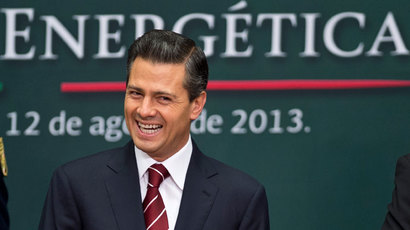Mexico approves historic bill ending 75-year oil monopoly
Mexico’s Congress has approved a bill to end a 75-year state oil monopoly by allowing foreign and domestic investors to enter the market.
The vote was passed 353-134, allowing private companies to explore and drill for oil and gas, which was not previously permitted. The bill still needs to be approved by 17 of Mexico’s 31 states, which is believed to be highly probable.
State-run oil company Petroleos Mexicanos, or Pemex, gained ownership of all natural resources when Mexico’s government took over operations from foreign oil companies in 1938. At the time, the move was viewed by many as a symbol of nationalism.
The bill carries key importance for the US, as Mexico is in the top five exporters of crude oil to America.
Mexican president Enrique Pena Nieto's Institutional Revolutionary Party and the conservative National Action Party were behind the proposal.
Many fiercely opposed the bill, with some leftist members of Congress trying to stop negotiations by blocking access to the chamber of the House of Deputies with chairs and tables, AP reported. A member of the leftist Democratic Revolution Party, Antonio Garcia Conejo, undressed during his speech to emphasize that the bill is a “plunder of the nation.”
“We must defend our oil,” Cuauhtémoc Cárdenas, a three-time presidential candidate and son of the president who nationalized the oil industry, said in a television advertisement. The state oil company, he added, belongs “to all Mexicans, and we must not allow it to go private.”

Those who oppose the bill worry that foreigners will regain control over Mexico, as they did before 1938.
"Today is a black day," Reuters quoted Ricardo Monreal, a government critic and leader of the leftist Citizens’ Movement in the lower house, as saying. "More poverty for everyone, which has been the rule for Mexican privatizations."
Many citizens also expressed concern. “Until now, we Mexicans used oil revenue to pay 40 percent of our public spending,” the Wall Street Journal quoted leftist priest Bishop Raul Vera as saying. “But now we'll have to negotiate that money with foreign oil firms. That's what awaits our children.”
Many economists view the new law as a positive change, and something that is required to help Mexico’s oil industry - whose production has dropped 25 percent since 2004 due to Pemax’s lack of experience in excavating deep-water gas reserves.
The new bill allows foreign companies to explore and drill in return for royalties and taxes payable to the Mexican government.
Foreign supporters of the bill believe that it will benefit all three countries under the North American Free Trade Agreement – the US, Canada, and Mexico. “We are going to be able to develop services and competencies in dealing with energy that are transferrable from one country to another,” Thomas Donohue, president of the US Chamber of Commerce, told AP.
“They all have some differences in commodities and have their own regulatory systems, but all of it will be in the context of a lot oil, a lot of gas, a lot of coal and a fundamental ability to attract manufacturing, to improve supply chain and to drive the creation of jobs and economic growth,” he added.














